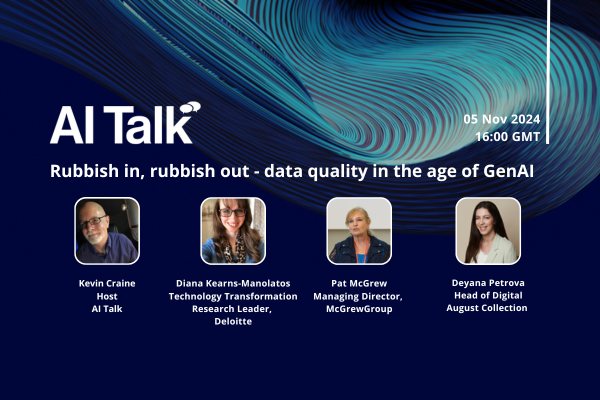Deskilling with AI

Geraldine Kelm at Pinsent Masons Vario asks whether we will lose valuable skills to AI
Being able to do complex mathematics, correctly sign off a letter or navigate the Dewey Decimal System to locate a piece of information – arguably all skills which were once highly valued and have now mostly been lost thanks to the advent of calculators, email and the internet.
With the explosion of artificial intelligence (AI) into our conscience this year, particularly with language models like ChatGPT, people are fearing valuable skills will be lost and at a rapid rate. Especially as AI can take on so many tasks, such as drafting convincing copy and writing and reviewing code.
In the world of business, and particularly in the world of law, it’s feared that AI could take jobs. So what skills are potentially on the chopping block in the world of business thanks to AI, and how do we manage this risk?
Most importantly: don’t get swept up in the hype. I think it’s worth remembering that there will always be room for human touch in the working environment, particularly in the legal profession, and technology shouldn’t be seen as a stand-alone solution.
We’ve seen the dangers of this recently, when a lawyer in New York appeared before the courts after he used the AI tool ChatGPT for legal research and it generated six false legal precedents. The AI tool also went so far as to create “bogus judicial decisions with bogus quotes and bogus internal citations”. After being questioned about the cases’ authenticity, ChatGPT had reassured the lawyer that the cases were real and could be found on LexisNexis and Westlaw.
This example is the first of many instances to come where generative AI tools are misused and trusted to do important legal work without any oversight.
However, lawyers have always been mindful and careful about delegating work. You wouldn’t let a junior run a case by themselves without checking for mistakes, and utilizing AI in the legal world isn’t any different. Whilst this form of technology has huge benefits and creates opportunities, it also shouldn’t be left alone, to potentially run amok.
Understanding the opportunities and limitations of generative AI is vital. In this New York lawyer case, he told the court he was "unaware that its content could be false". A common mistake as headlines espouses the life-changing properties of the technology. It’s easy to get swept up in the hype.
Also, ChatGPT can only currently draw on information available from before September 2021, meaning it might not be a useful tool for researching recent and current trends, news stories and cases. Likewise, many law firms have already flagged the potential data issues which could be caused by running sensitive client data through tools like ChatGPT.
Where AI can do a lot of the heavy lifting is repetitive work, for example, data entry or information extraction from huge piles of documents. For our work, supporting legal teams becomes more efficient and productive, and no one misses these jobs or considers handing them over to AI as losing a skill.
AI still requires human supervision, and the time gained leaves more space for our professionals to do more, and focus on more complex tasks. In the same way that not many people miss doing arduous equations by hand, or taking three days to travel to London when the train or car was invented.
Dr Gleb Tsipursky, a behavioral scientist said: “Just as the calculator didn’t make us less intelligent, AI won’t make us less capable. Instead, AI can liberate us from mundane tasks, giving us more time and energy to focus on complex, creative and uniquely human tasks. We are not being replaced; we are being upgraded. We are not losing our skills; we are evolving them.”
However, I would argue it is still worth thinking carefully about some of the jobs AI could be taking on in your team and the skills required to do those jobs which could be lost. Ultimately, AI still can’t convincingly mimic human emotions and the soft skills of relationship building and empathy. There is still a potential risk that some of these valuable skills could be lost, or at least not cultivated in younger people entering the workforce because, for example, they’re relying on AI to write emails to clients, rarely picking up the phone or engaging in in-person meetings.
I still believe the most creative and out-of-the-box problem solving will come from human minds, but those minds need practice and relying on AI to constantly help with problem solving will mean those muscles could get a big flabby.
There’s no doubt we’re on the precipice of an AI revolution and I expect 2024 will see this type of technology become more mainstream and integrated into not just legal businesses, but companies in most sectors.
Fears around losing valuable skills to AI aren’t new. Every time an innovation takes hold, people fear what the future will bring - radio will steal the art of conversation or text messages will ruin our language skills, for example. Socrates believed in 370BC that “writing is a step backwards for truth”. Fears around new technology and how they could impact society for the worse are not always well-founded.
However, I do believe it’s important that firms take an honest look at the soft skills which could be at risk in their teams – not just from AI but other factors such as remote or hybrid working. With fewer people in the office, for instance, training needs to be considered to make sure younger members of staff are still getting modelled good examples of soft skills and how to grow relationships with clients. Particularly the skills that might previously have just been picked up naturally by being around colleagues all day.
Investing in these soft skills and what makes us human is important and will mean we won’t mourn any other skills lost to AI in the future.
Geraldine Kelm is a Partner leading the UK Account Management delivery team for Pinsent Masons Vario’s flexible services
Main image courtesy of iStockPhoto.com

Business Reporter Team
Most Viewed
Winston House, 3rd Floor, Units 306-309, 2-4 Dollis Park, London, N3 1HF
23-29 Hendon Lane, London, N3 1RT
020 8349 4363
© 2024, Lyonsdown Limited. Business Reporter® is a registered trademark of Lyonsdown Ltd. VAT registration number: 830519543





